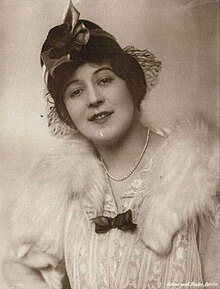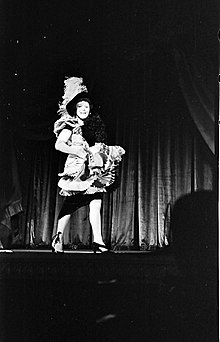Trude Hesterberg

Gertrud Johanna Dorothea Helene Hesterberg , called Trude (born May 2, 1892 in Berlin ; † August 31, 1967 in Munich ), was a German stage and film actress , cabaret artist , chanson singer , soubrette and operetta singer, as well as the founder and director of a cabaret stage. At the beginning of her vocal training she changed the first name Gertrude to Gertrude because it had a more poetic sound.
Life
1908-1921
Trude Hesterberg initially received private lessons from her aunt, an opera singer. At first her father was reluctant to accept his daughter's ambitions, but then consented to free singing lessons. Ms. Brieger-Palm later took over the vocal training, the cost of which the father only reluctantly agreed to. She had her first public appearance as part of a school performance in the Beethoven Hall in Berlin. Felix Robert Mendelssohn accompanied her to this performance on the cello . She began her classical vocal training on August 1, 1911 with Rotmühl at the Stern Conservatory . For some time, Trude had to keep the lessons that had started a secret from her father. She financed the expensive lessons by selling home-grown strawberries and eggs from her hens. Although her father was against the lessons, Trude was able to continue her education. Through her friendship with Suse Hollaender, the daughter of Gustav Hollaender , the director of the Stern Conservatory, Trude met Suses uncle Felix Hollaender . He helped her in 1912 to her first engagement in George Dandin von Molière , at the side of Alexander Moissi . She took on the role of Climène and received an annual engagement at the Kammerspiele in Berlin , as a singer, actress and dancer for a monthly fee of 115.00 marks.
Her first film role in a silent film was in the film In the Golden Cage in 1912 . At the same time she had smaller musical appearances at the Deutsches Theater in Berlin and as a chansonnière in a café on Kurfürstendamm . In addition, she was cast for operetta roles. Further film roles and cabaret appearances alternated. She performed in the famous Berlin Wintergarten (1915) and in the cabaret Schall und Rauch (1919) with songs based on texts by Kurt Tucholsky , Friedrich Hollaender and Erich Kästner .
1921-1945
In 1921, when Trude Hesterberg also got a role in the silent film Friedericus Rex , she founded the Wilde Bühne , one of the first political-literary cabarets. Walter Mehring acted as the in- house author, Leo Heller was also a regular author , who dedicated his book Aus Kneipen und Kaschemmen (Delta-Verlag, Berlin 1921) to her. After a devastating fire in 1923, she was forced to take up operetta engagements again. Although she never got a leading role , Trude Hesterberg was also successful in talkies , including Storms of Passion (1931) and A Blonder Traum (1932). Heinrich Mann had actually thought of entrusting her with the leading role in the Blue Angel , but then others prevailed. She also appeared in cabaret and on the revue stage: She was seen in the comedians' cabaret as well as in various Charell revues in the Großes Schauspielhaus .
In 1933/1934 Trude Hesterberg founded the cabaret Musenschaukel in the Mascotte Pavilion in Behrenstrasse, where the young Rotraut Richter also appeared for a while, but which was soon banned by the Reich Propaganda Ministry.
After 1945
After the war, Trude Hesterberg moved to Munich. There she had u. a. Guest engagements at the Gärtnerplatztheater , for example in the musical Fanny at the side of Christine Görner . The artist took part in several post-war films, including The Story of Little Muck (1953), Under the Stars of Capri (1953), The Gypsy Baron (1954) and alongside Heinz Rühmann and Heli Finkenzeller in the postman Müller . In her will she donated the Hesterberg-Ring for the best German female chanson singer, which was first awarded in 1967.
Trude Hesterberg was awarded the gold film ribbon in 1962 for "many years of outstanding work in German film". This award was presented here for the first time. A star in the Cabaret Walk of Fame is dedicated to her. Trude Hesterberg died on August 31 at the age of 75 after a long-term heart condition in Munich. She is buried in Munich's north cemetery (grave no. 97-U-197).
Quotes
“She stands there tall, slim and capricious. Sharp, in every sense of the word, on the cutting edge between lady and "lady". Every movement exudes temperament. The Hesterberg dances with her throat, sings and trills with her legs, does everything at the same time, is in an exuberant mood. Cheeky, good-natured, snippy and full of warmth - as required. "
Filmography
- 1912: In the golden cage
- 1912: the dancer
- 1914: The impostor
- 1916: The journey into the hereafter
- 1916: a serious painter
- 1917: The marriage school
- 1917: The telephone kitten
- 1918: The Rosentopf case
- 1921: A maid's novel
- 1922: Fridericus Rex
- 1925: Variety show
- 1925: front building and rear building
- 1926: Trafficking in Girls - An International Danger
- 1926: Manon Lescaut
- 1927: The Juxbaron
- 1927: Vice of humanity
- 1928: Two red roses
- 1928: The little slave
- 1929: The convict from Stambul
- 1929: Riots in the bachelor home
- 1931: Storms of Passion
- 1932: a blonde dream
- 1934: The Brenken case
- 1935: The green domino
- 1936: The robbery of the Sabine women
- 1937: The irresistible
- 1941: Jakko
- 1943: At the end of the world
- 1949: By a nose's length
- 1949: The blue straw hat
- 1949: The Red Cat's Secret
- 1950: Riots in Paradise
- 1950: The night without sin
- 1951: Corinna Schmidt
- 1952: Mandrake
- 1953: Under the stars of Capri
- 1953: The divorced woman
- 1953: Postman Müller
- 1953: The story of little Muck
- 1953: Jonny saves Nebrador
- 1954: The Gypsy Baron
- 1955: The happy wanderer
- 1955: sunshine and downpour
- 1955: Oh - these "dear" relatives
- 1956: The weird Otto
- 1956: The old forester's house
- 1957: At night in the Green Cockatoo
- 1957: Everything will be fine
- 1958: Dodo scandal
- 1962: Goodbye by the blue sea
literature
- Rolf Burgmer: Hesterberg, Trude. In: New German Biography (NDB). Volume 9, Duncker & Humblot, Berlin 1972, ISBN 3-428-00190-7 , p. 26 f. ( Digitized version ).
- Trude Hesterberg: What else I wanted to say. Henschelverlag Art and Society, Berlin 1971.
Web links
- Trude Hesterberg in the Internet Movie Database (English)
- Trude Hesterberg at The German Early Cinema Database
- Trude Hesterberg at filmportal.de
- Trude Hesterberg. At: cyranos.ch.
- Pictures by Trude Hesterberg In: Virtual History
- Trude Hesterberg in the database music and gender on the Internet.
Individual evidence
- ↑ Trude Hesterberg: What else I wanted to say. Henschelverlag Art and Society, Berlin 1971.
- ↑ Graves - North Cemetery. ( Memento of the original from November 18, 2011 in the Internet Archive ) Info: The archive link was automatically inserted and not yet checked. Please check the original and archive link according to the instructions and then remove this notice.
- ↑ Paul Marcus [di Pem ]: Die vom Brettl . In: Der Junggeselle , No. 23, June 2, 1926, p. 7.
| personal data | |
|---|---|
| SURNAME | Hesterberg, Trude |
| ALTERNATIVE NAMES | Hesterberg, Gertrud Johanna Dorothea Helene (full name) |
| BRIEF DESCRIPTION | German stage and film actress, cabaret artist |
| DATE OF BIRTH | May 2, 1892 |
| PLACE OF BIRTH | Berlin |
| DATE OF DEATH | August 31, 1967 |
| Place of death | Munich |


